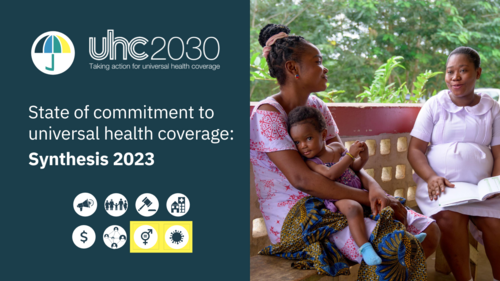La CSU2030 a organisé sa réunion annuelle à l'occasion de la...
12 décembre 2023
A look at the key findings of the 2023 State of commitment to universal health coverage

The year 2023 provided a unique opportunity to raise health high on political agendas: world leaders convened during the UN General Assembly for three high-level meetings on universal health coverage (UHC); pandemic prevention, preparedness and response; and tuberculosis, as well as for the Sustainable Development Goal (SDG) Summit. During the three health-related high-level meetings, heads of state and government and ministers renewed their countries’ commitment to making progress towards UHC and emphasized the importance of health systems strengthening, with primary health care (PHC) as the foundation to achieve UHC.
But even as countries renewed their commitments, 2023 painted a dire picture of the situation of health around the world. According to the Tracking Universal Health Coverage: 2023 Global Monitoring Report, more than half of the world’s population – 4.5 billion people – does not have access to essential health services, and 2 billion face financial hardship due to out-of-pocket health spending.
Health is not a privilege. It is a fundamental human right. Action is more urgent than ever to protect this right.
Key findings of the 2023 state of UHC commitment review
The State of UHC commitment brings a unique multi-stakeholder view to a simple question: Are countries acting on their commitments to UHC?
The 2023 review provides an alarming answer, with insufficient progress in service coverage and setbacks in financial protection. However, it also shows that, since 2015, countries have made various commitments to UHC, prioritizing equity and recognizing the importance of UHC for achieving SDG 3, Ensuring healthy lives and well-being for all at all ages.
Now is the time for countries to take urgent action to close the gaps between policy, implementation and results.
Here’s a summary of the key findings of the review based on the eight action areas from the UHC Movement Action Agenda:
- Ensure political leadership beyond health: Most countries recognize UHC as a goal but have not taken concrete operational steps to achieving UHC.
- Leave no one behind: Vulnerable individuals and groups continue to face financial and structural barriers to accessing the health services and commodities they need.
- Legislate and regulate: While 89% of countries have made UHC a central goal in their national health policy plans and strategies, 41% have enacted UHC laws to ensure equitable, affordable access to health services.
- Uphold quality of care: The global shortage of health and care workers, lack of support for the health and care workforce and inadequate health-care resources remain challenges to providing effective, safe, people-centred care for all.
- Invest more, invest better: Despite continued increases in overall health expenditure for the COVID-19 response, governments’ current investment commitments and public spending for health are inadequate to achieve UHC.
- Move together: Few countries have a formal, effective accountability mechanism for UHC, with inadequate multistakeholder engagement.
- Gender equality: Although women represent the majority of the health and care workforce, there is lack of commitment to achieving gender equality in the health and care workforce and to increasing women’s representation in overall political leadership for health.
- Emergency preparedness: Countries do not invest sufficiently in health systems strengthening based on primary health care to achieve UHC and health security.
Find out more about your country’s state of UHC commitment
The UHC Data Portal is a single interface for obtaining an overview of the state of UHC commitments in every country, for data on UHC and health systems and for visualization of official statistics on the SDGs and selected sources from UHC2030 partners.
Additional resources
In 2021 and 2022, the Civil Society Engagement Mechanism for UHC2030 (CSEM), in collaboration with other partners, held 37 focus groups (representing 40 countries) with civil society and community representatives about their personal experiences with the state of each key commitment area on UHC. This summary of insights and recommendations complement the data profiles and global synthesis, and can be found here.
